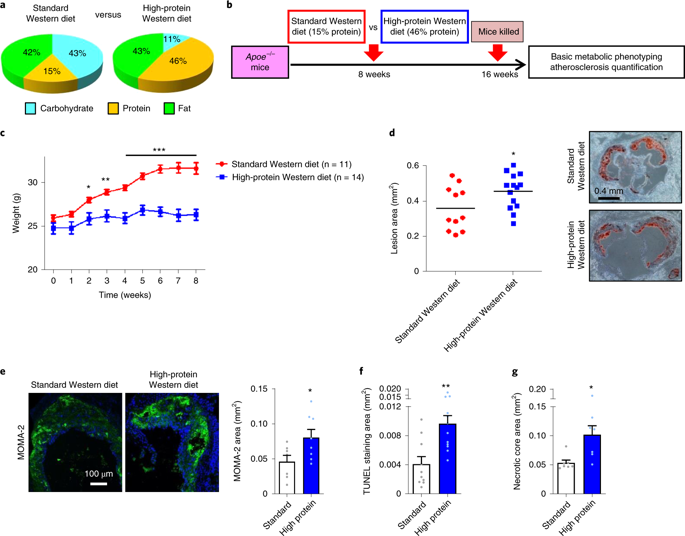当前位置:
X-MOL 学术
›
Nat. Metab.
›
论文详情
Our official English website, www.x-mol.net, welcomes your
feedback! (Note: you will need to create a separate account there.)
High-protein diets increase cardiovascular risk by activating macrophage mTOR to suppress mitophagy.
Nature Metabolism ( IF 18.9 ) Pub Date : 2020-01-23 , DOI: 10.1038/s42255-019-0162-4 Xiangyu Zhang 1, 2 , Ismail Sergin 1 , Trent D Evans 1 , Se-Jin Jeong 1, 2 , Astrid Rodriguez-Velez 1 , Divya Kapoor 1, 2 , Sunny Chen 1 , Eric Song 1 , Karyn B Holloway 1, 2 , Jan R Crowley 3 , Slava Epelman 4 , Conrad C Weihl 5 , Abhinav Diwan 1, 2 , Daping Fan 6 , Bettina Mittendorfer 7 , Nathan O Stitziel 1 , Joel D Schilling 1, 8 , Irfan J Lodhi 3 , Babak Razani 1, 7, 8
Nature Metabolism ( IF 18.9 ) Pub Date : 2020-01-23 , DOI: 10.1038/s42255-019-0162-4 Xiangyu Zhang 1, 2 , Ismail Sergin 1 , Trent D Evans 1 , Se-Jin Jeong 1, 2 , Astrid Rodriguez-Velez 1 , Divya Kapoor 1, 2 , Sunny Chen 1 , Eric Song 1 , Karyn B Holloway 1, 2 , Jan R Crowley 3 , Slava Epelman 4 , Conrad C Weihl 5 , Abhinav Diwan 1, 2 , Daping Fan 6 , Bettina Mittendorfer 7 , Nathan O Stitziel 1 , Joel D Schilling 1, 8 , Irfan J Lodhi 3 , Babak Razani 1, 7, 8
Affiliation

|
High protein diets are commonly utilized for weight loss, yet have been reported to raise cardiovascular risk. The mechanisms underlying this risk are unknown. Here, we show that dietary protein drives atherosclerosis and lesion complexity. Protein ingestion acutely elevates amino acid levels in blood and atherosclerotic plaques, stimulating macrophage mTOR signaling. This is causal in plaque progression as the effects of dietary protein are abrogated in macrophage-specific Raptor-null mice. Mechanistically, we find amino acids exacerbate macrophage apoptosis induced by atherogenic lipids, a process that involves mTORC1-dependent inhibition of mitophagy, accumulation of dysfunctional mitochondria, and mitochondrial apoptosis. Using macrophage-specific mTORC1- and autophagy-deficient mice we confirm this amino acid-mTORC1-autophagy signaling axis in vivo. Our data provide the first insights into the deleterious impact of excessive protein ingestion on macrophages and atherosclerotic progression. Incorporation of these concepts in clinical studies will be important to define the vascular effects of protein-based weight loss regimens.
中文翻译:

高蛋白饮食通过激活巨噬细胞 mTOR 来抑制线粒体自噬,从而增加心血管风险。
高蛋白饮食通常用于减肥,但据报道会增加心血管风险。这种风险背后的机制尚不清楚。在这里,我们表明膳食蛋白质驱动动脉粥样硬化和病变复杂性。蛋白质摄入会急剧升高血液和动脉粥样硬化斑块中的氨基酸水平,从而刺激巨噬细胞 mTOR 信号传导。这是斑块进展的原因,因为饮食蛋白质的影响在巨噬细胞特异性 Raptor-null 小鼠中被消除。从机制上讲,我们发现氨基酸会加剧由致动脉粥样硬化脂质诱导的巨噬细胞凋亡,这一过程涉及 mTORC1 依赖性抑制线粒体自噬、功能障碍线粒体的积累和线粒体凋亡。使用巨噬细胞特异性 mTORC1 和自噬缺陷小鼠,我们在体内证实了这种氨基酸-mTORC1-自噬信号轴。我们的数据首次揭示了过量蛋白质摄入对巨噬细胞和动脉粥样硬化进展的有害影响。将这些概念纳入临床研究对于定义基于蛋白质的减肥方案的血管效应非常重要。
更新日期:2020-01-23
中文翻译:

高蛋白饮食通过激活巨噬细胞 mTOR 来抑制线粒体自噬,从而增加心血管风险。
高蛋白饮食通常用于减肥,但据报道会增加心血管风险。这种风险背后的机制尚不清楚。在这里,我们表明膳食蛋白质驱动动脉粥样硬化和病变复杂性。蛋白质摄入会急剧升高血液和动脉粥样硬化斑块中的氨基酸水平,从而刺激巨噬细胞 mTOR 信号传导。这是斑块进展的原因,因为饮食蛋白质的影响在巨噬细胞特异性 Raptor-null 小鼠中被消除。从机制上讲,我们发现氨基酸会加剧由致动脉粥样硬化脂质诱导的巨噬细胞凋亡,这一过程涉及 mTORC1 依赖性抑制线粒体自噬、功能障碍线粒体的积累和线粒体凋亡。使用巨噬细胞特异性 mTORC1 和自噬缺陷小鼠,我们在体内证实了这种氨基酸-mTORC1-自噬信号轴。我们的数据首次揭示了过量蛋白质摄入对巨噬细胞和动脉粥样硬化进展的有害影响。将这些概念纳入临床研究对于定义基于蛋白质的减肥方案的血管效应非常重要。











































 京公网安备 11010802027423号
京公网安备 11010802027423号